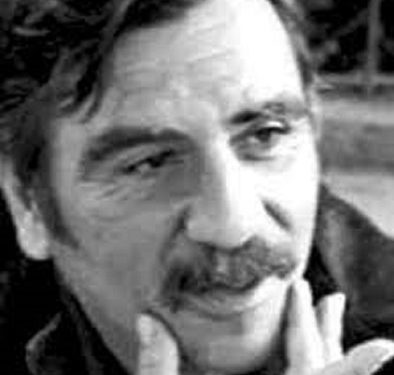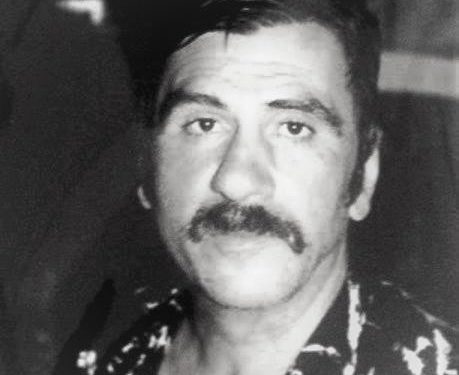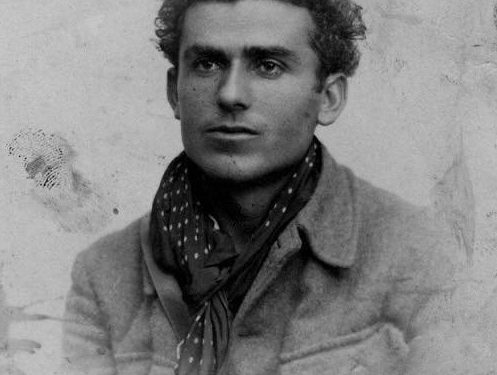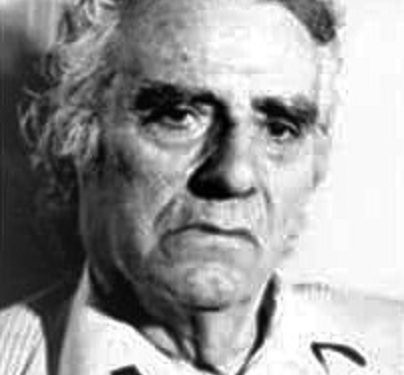From Rezarta Delisula
Memorie.al / From a distance, he looks like his father. Tall, with dark skin and dark hair. Everyone greets him. When someone is out of his mind, he speaks in front of him: “Where are you”… while we remember “My apology (to life)” written by the great Petro Marko; “-Where were you born, young man? – O life, I was born in the desert! – Where do you live and where are you, in what land and sea?!…”. We met Jamarbër, or Maduna, as everyone has been calling him for years, the only son of the writer, known as the “Bishop of Literature”, Petro Markos. The “pseudonym” was left to him by a little girl, who could not pronounce the whole name and called him; Madu.
He has overcome many difficult trials. Since he finished his studies in Journalism, the regime imprisoned him in Spaçi prison. The young man openly criticized popular power, but above all, he was the son of Petro Marcos.
When we ask Maduna, that; what was the worst day of his life, he says about that day when his cat died, when he was 10 years old. And when we are surprised, it comes back to us: “I knew what was waiting for me, I was prepared”, while it reminds us of an expression of Schopenhauer: “He who is young foresees the future, he who is fluent lives with the past , the majority of people live in the present”…!
From early youth, Madu’s love was and continues to be poetry. They had once told him that; poetry does not give you bread, and the young man replied that; even bread does not give you poetry. To write poetry.
This is what Madu continues to do today. He continues to live in the house where he was born, where the great writer has always lived, on “Zogu I-rë” boulevard, very close to the Maternity Hospital.
Once Madu, like his father, worked as a journalist, but after so many years, he only writes. The son of Petro Markos spends most of the day at the old, painted wooden windows, at the windows of the second floor, which overlook the “Dervish Hatixhe” alley.
How has his life been, the problems caused in his youth and lost love, the last conversations with Petro Marko and what his father never taught him…!
Between the interview with Jamarbër (Maduna) Marko, we will try to understand what many Albanian intellectuals have removed, the incurable pain that Enver Hoxha’s brutal regime caused them.
Tirana, April 10, 2007
What virtue did you inherit from your father?
It has always helped me to withdraw into myself, to understand. When I began to understand it, I thought that this was so little, that I should start my life, no longer on this dirty globe, but in other galaxies.
What didn’t your father teach you?
Petro Marko never told me about the real torture. I understood them when I was tortured myself.
What was the last conversation you had with your father?
He was lying in bed, a few days before he died, and he said to me: “O Madu, do you remember that democracy is coming to Albania”?! I was silent, while he continued…; “Without 50 years, the first step to transition to democracy is not taken”. And I think the reality is like that.
In the 90s, did you ever think about getting involved politically?
It would take me a long time to think about it, while to participate, it would be impossible.
What was the worst day of your life?
When I was 10 years old, I had a very beautiful cat, which went to drink water from a tap and died at that moment.
When we ask you about the bitterest day, you say when you lost your cat. Wasn’t punishment a bad day for you?!
No, because I expected punishment. (And I remember a very true expression. He who is young, foresees the future. He who is fluent, lives with the past. Most of the people, lives with the present). I knew my destiny. I was the son of Petro Marcos.
What about the most beautiful day?
I was holding a rose in my hand. The wind started and the rose fell on a girl’s blouse. She would surely become my girlfriend.
That’s how it really happened, because it’s so poetically said?
I have loved every woman I have met who felt more for herself than for me. Listen, I think that; if you fall in love as physical, love will turn into manure. If you fall in love as a thought, you will rise even when you are dead.
Can you tell us more specifically, is this a true story?
It is the story of a girl whom I loved but avoided. I was in my 20s and finally, after many insistences, I told her that if she was near me, she would suffer. It really happened like this. After a few months, I was imprisoned, and when I got out of prison, she came to my house and met me. Of course, he thanked me for saving him from suffering.
After the end of the sentence in 1978, they did not try to imprison you again?
I remember that around 1979, I was called to the Department of Internal Affairs and the chairman, after I talked with him, told me: “You still have your place in Spač”. I listened to him and said: “Be careful, lest you get cancer in your pancreas and you won’t know where it came from…”! He shouted me out of the office. His fate was as I had predicted and while he was leaving for Rinas to be cured in France, he had given instructions to his subordinates that no one would drive me anymore.
What is your pledge?
I wish I had a phone in Spaç, so that I could call Enver Hoxha and tell him, get dirty, get a dog…!
When you came to Tirana, did you try to do what you didn’t do in Spaç?
Enveri was hiding from all of Tirana, so I had no chance…!
Do you think that, deep down, Enver Hoxha had a dose of positivity?
He was among a group of students who came from France, who posed as Marxist-Leninists and left no one unkilled and destroyed before they died.
What have those years of prison denied you from life?
I was shy then, and then when things turned different, I became my own executioner.
What sensation do those years in prison create?
The feeling of freedom in a suppressed place is more complete than in an open place. If I had not been imprisoned in Spaç, I would never have understood what true freedom is. Sometimes I miss the galleries of Spaci.
Are you free?
In the suppressed moments I felt freedom as romantic sensitivity. While in the freest moments, freedom becomes a “dupe”, that sings to the neighbors.
What do you miss the most?
I miss myself more than I ever was.
And how have you been?
A stone creature that observes, but does not take any action.
who are your friends
I do not know.
Who did you have as a friend then?
My only friend is humanity and nature. My lost friend, is heaven and infidelity. The friend who sits next to me is failure and victory. If other friends were found, I would have left this world.
You have published two books of poetry. Do you have any imminent plans to publish a third book?
I published the first book, “Rastëstës me dashë”, in 1995, and “Pro nobis”, in 2001. Now I have another book ready, with poems.
Have you ever tried to write prose?
Of course, but I think with prose, you become too small. For me, poetry is the first step towards intimacy with everything.
Are you afraid of death?
Twice more and once less.
Why?
Because when it comes, you can’t recognize it. It’s gone, you have a moment of disappointment.
If you were to decide when you would live, would you prefer the Middle Ages, the early 20th century, or the future?
I would decide to live in the period before the arrival of humanity. I would be a tree without flowers, without fruit, I would have only a little sky.
Where do you believe?
If I believed in distinguishable things, I would be a magician. If I believed you, I would stand on a log in the ocean, waiting for contact with the most distant island in the world.
Without name
All the miracles fell down the precipice
No one noticed them
Only the unknown
Sitting at his bench
Looking forward to the future
Everyone dreams of being the last cigarette in the big pack
Where smoke covers everything
Leave the sharp tip untouched
Where the real man lives
(Written by Madu, at the age of 20, published in the first book.)
Jamarbër Marko: “The poet does not know how to return”
The poet Jamarbër Marko passed away at the age of 59, after a serious illness. Son of the writer Petro Marko and the painter Safo Marko, he left behind entire notebooks of unpublished poems, which his sister Arianita Marko decided to publish in a collection.
Just before he passed away, at midnight on Friday, he told her that he had set the title: “I don’t know how to come back.” A title that comes as a message, as the last line of poetry for everyone
She went down the narrow stairs. The people around made room for him to pass. She stayed alone and waited for her brother. For the last time he conveyed it. He left the house and will not return. Brother, Jamarbëri is not alive. Her sister, Arianita, hugged her, kissed her, caressed her, talked to her and took care of her for the last time.
At midnight on Friday, (something more or less), he left this world. Silent. So strong, she didn’t make a sound. He didn’t even tell his sick mother. He hid his son’s death from Sappho. But the mother felt something.
With all the illness, he raised his voice and said: “Lord, how will we wake up this night, until 3 o’clock (in the afternoon) comes.” Safoja told her the time when she would escort her son to the last apartment, and Nita respected her decision.
“Desert me, I have made Maduna sick”… she felt it, even though everyone was silent in front of her. Safo Marko, continues to lie in bed and in some moment of awakening, maybe she is surprised, how many people enter and leave her room. Maybe she even realized that something is wrong with her Maduna…?!
Friends and relatives, only they come to the Marko family. But they are few. It’s strange how he waits when a man, a son of art, a poet, an artist like him, leaves his life, he waits for people to pour down the river and that “Zogu i Parë” Boulevard, up to the steps of the house where the writer Petro Marko lived, be full. People of culture are missing. Those who take the name of this family in their mouths when they want to work are held in high esteem and who forget them as they turn their arms.
Today, they are so few that it fills you with sadness. It is a sadness that is added to the mort that has fallen, the gloom of time, of the small apartment, of the great Marks.
Poet Xhevahir Spahiu, actresses Rajmonda Bulku and Yllka Mujo, are the only personalities present. The Minister of Culture, Ferdinand Xhaferaj, has only sent a message of condolence, and that through the press spokeswoman…!
On the lifeless body of Jamarbër, in a wreath of flowers, you are impressed by the message written on the ribbon: “Thank you for the sacrifice of your family. With respect, ‘World of flowers'”. Sometimes from those you don’t know, the most respect comes. big.
Jamarbër Marko passed away yesterday at the age of 59. The poet suffered, not only from the disease, (diagnosis: cirrhosis of the liver), but more from the past. He insisted on not being cured. It was a self-surrender that could hardly be reversed.
Something beyond imagination, perhaps, had happened in his soul, the poet’s soul, and he could not return. He surrendered to his fate, his thoughts, so he gave up on life, or on himself, who knows?! Madu did not know how to turn back.
Despite all the efforts, even Arianita could not change his decision. He had no choice but to respect him until the end, to stay by his side, because that’s how he chose to have his end, in his father’s house, in his sister’s hands, next to his sick mother.
He was once asked if he was afraid of death, and he answered: “Twice more and once less. Because when it comes, you can’t tell. It’s gone, you have a moment of disappointment.”
But yesterday she was not disappointed, she waited for him, she did not run away. Madu chose to follow him. And if he believed in another world, who knows, maybe he is lucky to be, at least now, “a tree without flowers, without fruit, with only a little sky”. To enjoy the freedom, what he had missed during the years of prison in Spaç and, maybe even during the prison of the life he experienced, so withdrawn and left in oblivion.
She weeps in silence, as the Marcos are accustomed to live. Even the screams are like that, silent. “He was my brother,” just to say this he let out a voice.
As if to say that now crying was legitimate, that now he could throw off the mantle of “strong” to express his pain. She stood by him until the end, as only a sister who loves her brother very much can do.
And despite all the suffering, still strong, she finds the courage to talk about her brother, about his last moments and above all about the last collection of poems, to which shortly before he died, Jamarbër Marko gave the title himself: ” I don’t know how to go back.”
September 2010
Arianita Marko: “Madu wanted to live and die, without making compromises”!
Ms. Arianita, how was the condition of Jamarbër, especially recently?
His condition recently was miserable, he wanted assistance, he wanted help, which I, as a sister, have given him. I have given her as much help as a sister can give to a brother whom she loves very much. But there was no other help. He refused to make medical visits. It was as if he refused to live, as if he had decided the end…! Because he had seen and has seen all the things that could happen. Madu did not lie easily. He wanted to die at home. I didn’t do anything against his will, I kept him at home, feeling him close until the moment he left.
What did he think about the situation, especially the recent times of the Marko family. What did he say during the conversations you had?
We don’t talk, because we are not young enough to talk about situations. We know the conditions, because the parents have gone through several periods of time, which are several regimes, with several changes. We know how people suffer, how artists, the honest, the rich suffer, and we accept them. We know how to suffer and go away in silence. I personally made a call, I broke the silence and I don’t regret it.
I did it to ask for help for this family, which deserved a little more attention, because it has given so many people as families, as artists. They loved people, life, they saw the disappointments that sought the truth and then…! I asked for help not for myself, but to keep them. A modest helping hand came recently. But my love as a sister and as a mother for my mother, they have not missed and will never miss. I sacrificed myself with all my heart, for the three artists I had at home.
Madu, as everyone called him, somehow refused to publish his creations. Why?
Madu did not want his writings to be published, because we, as children, are used to publications. We were not of those who rejoiced when something was published for the first time, whether important or insignificant. We were for value publications. Not that he has refused to publish, but I don’t know, maybe…!
Did he leave manuscripts?
Yes. Madu has left behind many blocks of poetry, which I say that maybe if I am alive, I will publish them. Yesterday (Friday) before he died, I told him: I have decided to publish your poems. I asked him to come up with a title and he said he had one in mind: “I don’t know how to go back.” It’s a very thought provoking title. It means I don’t know how to come back from death, I don’t know how to come back to life, I don’t know how to come back from the beginning, I don’t know how to come back to hope…!
How long ago, did you make a selection of poems that you would like to publish?
I have not made any selections of poems. I made the selection of medical assistance. It is more humane to convey them by hugging them, kissing them, feeling the closeness as a person, than a publication. The publication comes later. I feel close to my brother, as a person.
Has he been writing recently?
Recently, he could not write, especially after the accident.
How were the last moments of the poet?
Madus’ last moments… a man died, suffering a lot. He chose to die in my hand and I held his hand until the end, kissing him, hugging him, holding his hand, until his last moments. That it was better to happen in the arms of the sister, than in the arms of any other man.
The reader knows him as a poet, son of the writer Petro Marko and the painter Safo Marko, but how was Jamarbëri a person?
Madu was a man who suffered all his life. It was very special. He was an artist born in a family of artists. He wanted to live and die without making any compromises. Memorie.al















